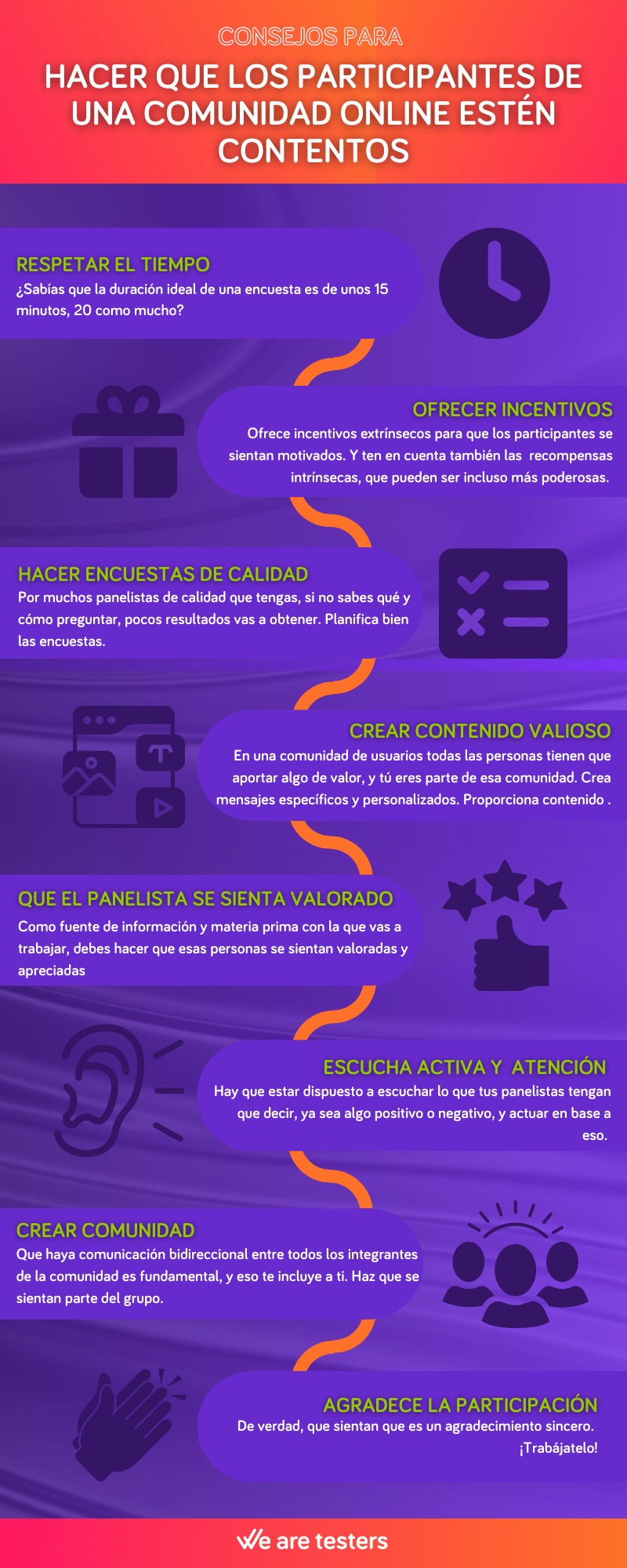
An online community is a magnificent tool to obtain firsthand information from users who are also interested in the topic you want to research.
We’ve discussed this topic before on this blog and explained to you what online communities are and how you can benefit from them.
In this case, we’re going to delve a little deeper into this matter and focus on the participants of that online community.
What requirements should these individuals meet? How can you recruit them? What are the keys to their participation and motivation?
We’ll talk about all of this in this article.
What Companies Learn from Online Communities
The most important question: Why? What is the reason that justifies a brand or company setting up an online community? The short answer would be that it’s an excellent promotional tool that allows for a connection between the company and consumers.
Digging even deeper, we have to tell you that an online panel is a very useful tool for obtaining qualitative information.
After all, in a community of users, what is done is sharing experiences and insights. It’s a safe place where people can freely express their opinions. It’s a close-knit environment, and that’s why you can gather many details that you wouldn’t get through more «impersonal» methods. And those details don’t have to be only about what you offer; you can also learn a lot from what they say about your competition.
When creating a community, keep in mind that you’re not only attracting customers but also potential customers.
In summary, user communities are customer magnets and a rich source of qualitative information.
Requirements for Participants in an Online Community
It’s true that an online community can provide valuable information, but for that, you need high-quality participants in your online community.
It’s not just about gathering users and asking questions. It’s a much deeper process with specific objectives and goals.
That’s why it’s crucial to have participants who genuinely matter, those who will contribute to the research at hand. Additionally, the company has an obligation to nurture these panelists, bring out the best in them, and keep them motivated to continue participating.
Let’s look at some aspects to consider.
Target Audience: Recruiting Panelists
It’s the first step before embarking on any marketing strategy. Who are you targeting? Do you want information from your entire audience, or just a specific group?
If you know exactly who you want to form your user community with and for what purpose, it will be easier to build your community.
As for recruitment, it’s essential to choose the right channels to invite your target audience to join your online community.
What platforms does your target audience use? How can you approach them using those platforms? If you decide to use email, for example, you need to ensure that your proposal only reaches the people who interest you, and, of course, that your message doesn’t end up in the spam folder.
If you opt for a tool like the one we have at WATLab We are testers, you also need to ensure that the panelist profiles who will participate in your online community align with your needs.
Platform Usage
Another crucial factor to consider. When you invite someone to your house for the first time, don’t you try to make everything perfect to create a good first impression? The same goes for online communities. When panelists enter your community, they should feel welcomed and should have no trouble accessing or navigating. Usability is one of the important factors to take care of.
Also, consider what information you’ll share and how you’ll provide it. If you want to encourage participation across your community, you need to ensure that everyone understands you perfectly.
Remember that the goal is to create a conversation, but it’s also not a good idea to introduce highly controversial topics.
Planning
As always, the less room there is for improvisation, the better.
How long does the community need to exist to achieve results? How much interaction is required to meet the goals within the estimated time? How will you manage conflicts/negative comments? And how will your company participate in the community?
All of this must be established in advance. Pre-planning is one of the factors that can determine the success or failure of the set objectives.
How to Recruit Panelists for an Online Community
Undoubtedly, panelists are the most important part of your user community. They are the foundation of this strategy, and that’s why time and resources must be dedicated to their recruitment.
Often, not enough importance is given to this step, and as a result, the outcomes are not as good as expected. In many cases, the reason for poor performance is errors made during recruitment, with the most common being underestimating its importance.
But another common mistake is a lack of communication.
For this process to be successful, all parties involved must be clear about the target audience.
Different groups of people can be involved in this process, which is why it’s vital that all groups know the desired characteristics that community members should have.
It’s possible that if you have a very defined target, you may attract a smaller number of people. But remember, quality over quantity.
Tips for Keeping Participants in an Online Community Happy
It’s clear that recruiting the right people is crucial for the success of your community.
And since we’ve invested so much in getting the best of the best, we need to make sure they stay, right?
Here are some tips to keep your panelists happy:
Respect Time
Did you know that the ideal duration for a survey is around 15 minutes, at most 20? Keep this in mind when you want to conduct one with your community. You might find it very interesting to create a lengthy survey, but we all have our limits. Sometimes, when we see that someone is highly interested in the topic, we tend to make questionnaires longer than usual. Be careful not to overdo it!
Offer Incentives
It’s true, the participants in your community are interested in the topic. However, if you launch a survey in your community without any incentives, only a few people will respond. You need to think about what incentives will work best for this group, and it’s advisable to plan (in case it wasn’t clear already, planning is VERY important) which incentives will be used.
Remember that transparency is appreciated, so make it clear at all times what they will gain by answering your questions.
Additionally, when we talk about incentives, we refer not only to extrinsic rewards like these but also to intrinsic rewards, which can be even more powerful. Create a sense that they are contributing to something meaningful, helping a cause, or aiding someone else.
Create High-Quality Surveys
It might seem a bit obvious, but no matter how high-quality your panelists are, if you don’t know what and how to ask, you won’t get many results. Before conducting any survey, you need to plan (yes, once again!) each one: What information do you want to gather? How long will it be? What are the right questions to ask?
Provide Valuable Content
You’ve probably heard the phrase «content is king.» Well, in online communities, it certainly is. In a user community, everyone should contribute some value, and you are part of that community.
So, every time you’re about to comment or write something, ask yourself: How can I contribute something to this community?
Create Specific and Personalized Messages
This will greatly increase engagement as you communicate directly with members. Having these kinds of personal touches will make them feel there’s a person on the other side.
For example, something as simple as sending a birthday greeting. And if you offer a special reward as well, all the better!
Provide Meaningful Content
Always offer meaningful and impactful content to your panelists. Through content, you can cater to your users’ needs and provide them with more value.
Good content can be the driving force behind long-term engagement. The more engaged your members are with community activities and what’s happening within the community, the healthier the community will be. This, in turn, can lead to higher response rates and better results.
Let meaningful and valuable content be the engine of your community.
Furthermore, good content enriches the community itself and helps participants stay motivated. It also conveys the value the community offers, which can amplify the intrinsic rewards members receive when participating in your community.
Make Panelists Feel Valued
The panelists of an online community are your source of information. Thanks to the data they provide and what they share with you, you can make strategic decisions for your business.
It’s important to always keep this aspect in mind and appreciate it properly.
As a source of information and raw material you’ll work with, you need to make these people feel valued and perceive that their participation and interaction are appreciated.
Listen Actively and Pay Attention to Complaints
There will be complaints in your community. It happens in all communities at some point and is inevitable.
That’s why you have to be willing to listen to what your panelists have to say, whether it’s positive or negative.
Likewise, listening alone is not enough; if they have improvement suggestions, take them into account! Don’t see it as an attack but as an opportunity to improve and evolve.
Create Community
This might be a bit confusing. Aren’t we already doing it? Just naming it a community doesn’t make it one.
For it to truly be a community, all members must feel that they are part of a group. Two-way communication among all community members is fundamental, and that includes you.
It’s also important to create a sense of belonging.
Take advantage of what we mentioned earlier about the importance of providing valuable content to users and use that to foster a sense of community.
Express Gratitude for Participation
Gratitude is a sign of good manners. It might seem trivial, but many people pay attention to details like this.
And no, we don’t mean a generic message like «thank you for completing the survey» at the end of a survey.
It’s an online community, yes, but it’s made up of people.
If you want your panelists to have a close relationship with you, you’ll need to reciprocate that closeness, right?
Update date 14 April, 2024



